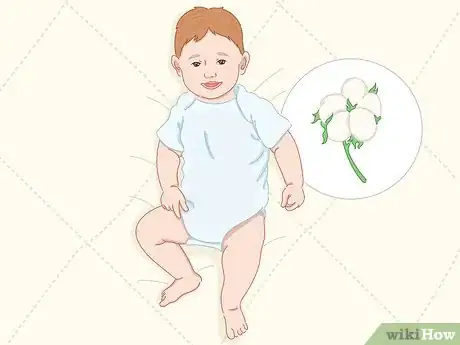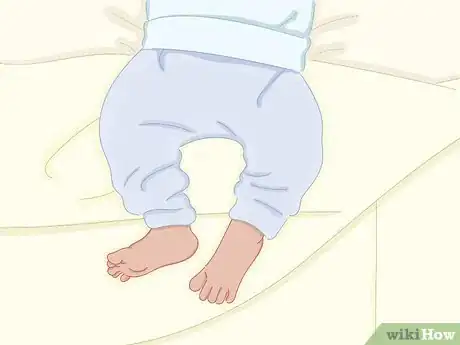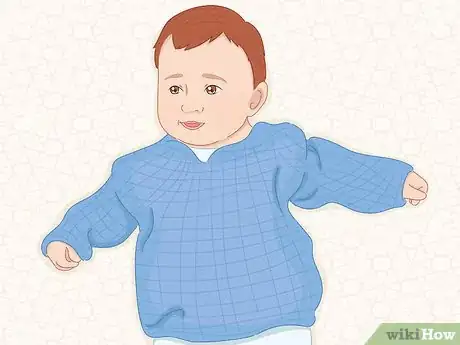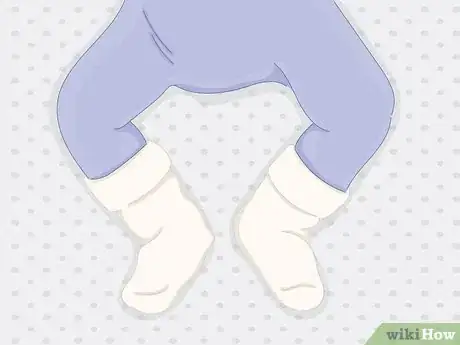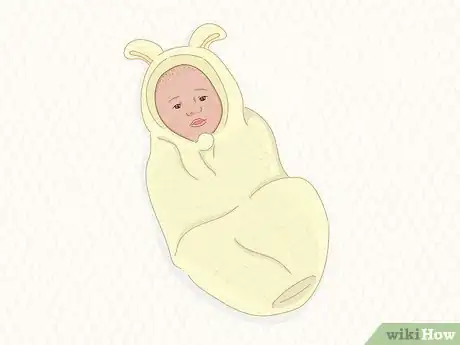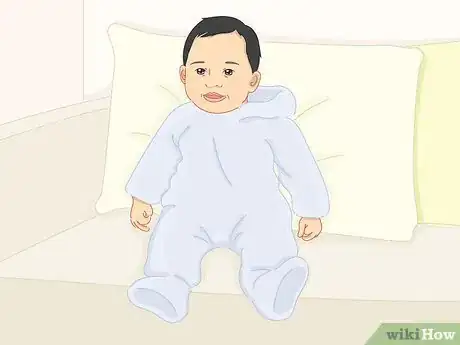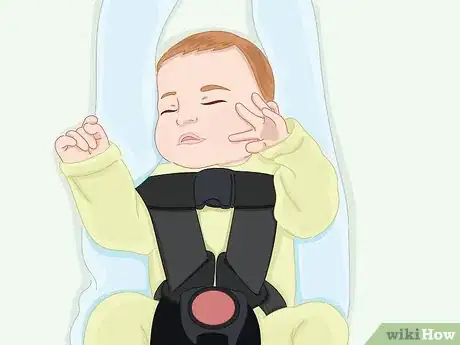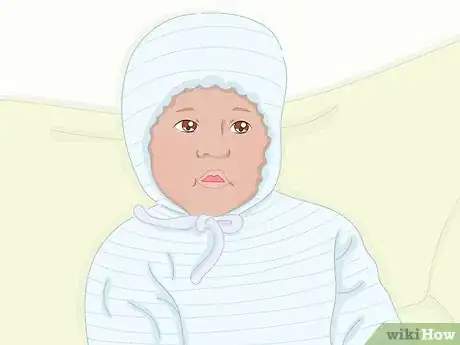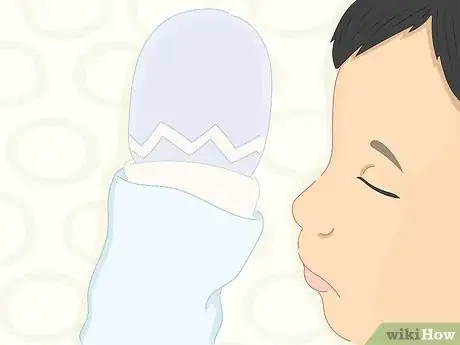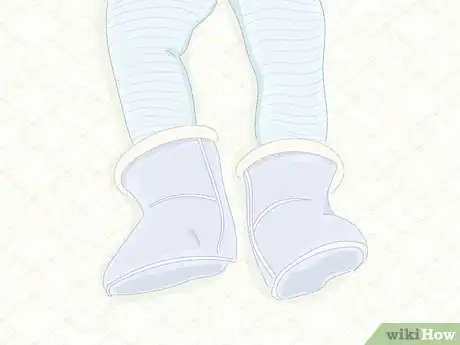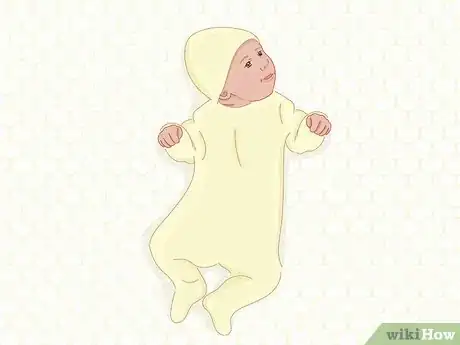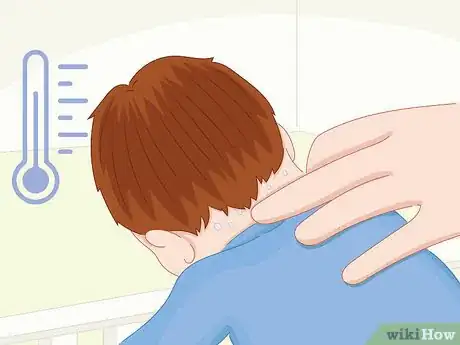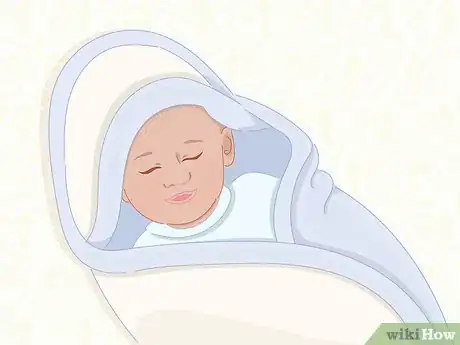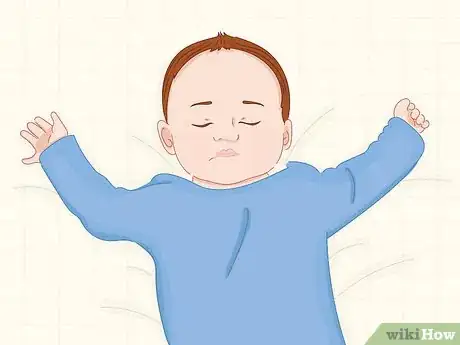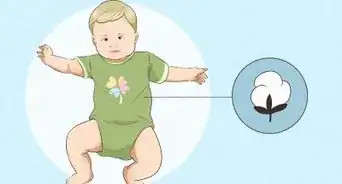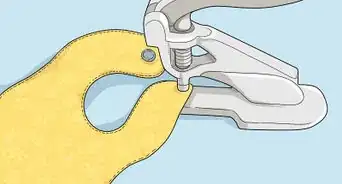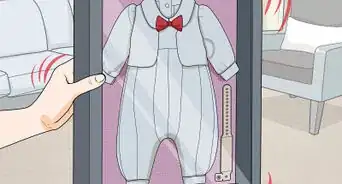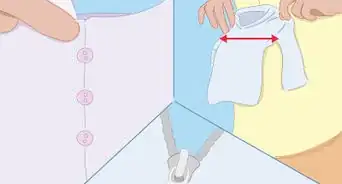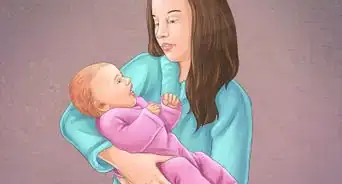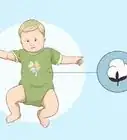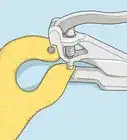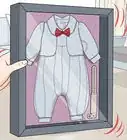This article was co-authored by Julie Wright, MFT and by wikiHow staff writer, Jessica Gibson. Julie Wright is a Marriage and Family Therapist and the co-founder of The Happy Sleeper, which offers sleep consulting and online baby sleep classes. Julie is a licensed psychotherapist specializing in babies, children, and their parents, and the co-author of two best selling parenting books (The Happy Sleeper and Now Say This) published by Penguin Random House. She created the popular Wright Mommy, Daddy and Me program in Los Angeles, California, which provides support and learning for new parents. Julie's work has been mentioned in The New York Times, The Washington Post, and NPR. Julie received her training at the Cedars Sinai Early Childhood Center.
There are 7 references cited in this article, which can be found at the bottom of the page.
This article has been viewed 69,288 times.
Dress your baby in layers during the winter to keep them warm and comfortable. If you think your baby is getting too hot, you can easily remove a layer. To keep your baby comfortable at night in the wintertime, put them in footed pajamas and a wearable blanket. Always remember to avoid putting blankets or pillows in the crib until your baby is at least 1 year old.
Steps
Dressing Your Baby for Indoors
-
1Put a soft cotton onesie on your baby. For the first layer, dress your baby in a comfortable onesie made of a breathable fabric such as wool or cotton. This will help moisture escape so your baby stays warm and dry.[1]
- While you can dress your baby in a short-sleeve onesie as long as they're very well layered, try to use long-sleeved onesies for the best coverage.
-
2Add fleece pants to the outfit. To add another insulating layer, dress your baby in pants to help trap warmth. Select fleece pants with a snug waist band so they don't slide down your baby's torso.[2]
- For the warmest pants, look for ones with that extend and cover the feet.
Advertisement -
3Add a light jacket or sweater. Since most baby onesies are thin, dress your baby in another layer such as a thin fleece jacket or long-sleeved sweater. Pick a jacket or sweater that's soft. If your baby gets too warm, you can easily take off the jacket to remove a layer.[3]
- For example, once your baby has a long-sleeve onesie on, put on a pair of pants and a light, fleece sweater.
-
4Put warm socks on the baby. If you're dressing your baby in a bodysuit, look for one with attached feet covers. If you're layering your baby in a onesie and pants, put a pair of warm socks on their feet. Try to choose socks with slightly elastic bands that won't slide off the baby's feet.[4]
Adding Layers for Taking Your Baby Outdoors
-
1Button your newborn to 6-month-old in a baby bunting. If you want to take your baby outside in the winter, they'll need a few more layers to stay warm. Once you've dressed them in a few light layers, put them in a polyester or down-filled baby bunting.[5]
- If you have a newborn, you'll also need to wrap them in a blanket.
-
2Add a coat or snowsuit for 6- to 12-month-olds. To take an older baby outdoors in winter, choose a coat or snowsuit filled with polyester or down. Look for one that has a hood attached so you can easily put it up over your baby's head.[6]
- The hood should completely cover your baby's ears as well. If it doesn't, put a fleece hat on your baby's head under the hood.
-
3Avoid putting a coat on the baby if you're putting them in a car seat. Bulky coats or puffy jackets will flatten instantly if there's a car crash which will leave a gap between the baby and the car seat harness. Instead, buckle your baby into their car seat and then lay a blanket or coat over the baby.[7]
- To make it easier to get your baby into their car seat in the winter, keep the seat in the house. Buckle the baby into it and lay the blanket over them. Then you can quickly carry the baby in the car seat to the car once you're ready to go.
-
4Cover your baby's head and ears with a warm hat. Look for a hat that will go down over the ears or that has ear flaps. Feel the inside of the hat to ensure the fabric isn't scratchy and won't irritate your baby. Many baby hats are lined with fleece so they're comfortable and insulated.[8]
- Choose a hat that has a Velcro strap and use it to secure the hat under your baby's chin. This way they're less likely to pull the hat off.
-
5Put mittens on the baby's hands when they'll be outside. Since babies have such small fingers, they get cold very quickly. To protect their hands, put thick mittens on them. Choose mittens that your baby won't be able to pull off easily.[9]
- Avoid trying to put gloves on your older baby since it will be too difficult to get the individual fingers into them.
- If your newborn's onesie has hand covers near the cuffs, fold them over the hands for an extra layer of protection.
-
6Put boots on your baby to keep their feet warm. Cover your baby's feet with thick socks and then put their baby boots on. These sturdy boots will prevent their feet from getting too cold in the winter.[10]
- It may be hard to find thick winter boots for small babies, so you may need to put several layers of socks under their booties if you can't find boots.
Keeping Your Baby Warm at Night
-
1Choose footed pajamas to put your baby in before bed. Put your baby in a footed cotton onesie that covers their arms, legs, and feet. If your baby's room is very cold, you can also put a sleeveless onesie or vest on the baby under the pajama onesie.[11]
-
2Check your baby's back or tummy to see if they're cool. The best way to determine if your baby is warm enough is to feel their back or tummy. It should feel warm, not cool or sweaty. If your child's hair or face is sweaty, they're probably too hot.[12]
- Don't use the temperature of your baby's hands or feet to determine if they're cold since these are normally a little cooler than the rest of the body.
-
3Zip or button your baby into a wearable blanket if their room is cold. While some baby sleep bags are one-size fits all, others are available in sizes to fit your baby. Set your baby in their light pajamas into the wearable blanket and then zip or snap them in. Many of these also have Velcro wraps that you can tuck around the baby so they feel swaddled.[13]
-
4Avoid putting blankets, pillows, and loose bedding in the crib. It's tempting to think that your baby will be cozier if there are quilts, pillows, or blankets in their crib. Unfortunately, having loose bedding in the crib can cause babies to suffocate if they can't push the item away from their face. Instead, just cover the mattress with a sheet and place the baby in the crib.[14]
- The American Academy of Pediatrics recommends waiting until your baby turns 1 before putting a blanket in their crib.
- You can make your baby's crib a little warmer by putting a flannel fitted sheet on the mattress in winter.
Expert Q&A
Did you know you can get expert answers for this article?
Unlock expert answers by supporting wikiHow
-
QuestionHow should I dress my baby in winter in Canada?
 Julie Wright, MFTJulie Wright is a Marriage and Family Therapist and the co-founder of The Happy Sleeper, which offers sleep consulting and online baby sleep classes. Julie is a licensed psychotherapist specializing in babies, children, and their parents, and the co-author of two best selling parenting books (The Happy Sleeper and Now Say This) published by Penguin Random House. She created the popular Wright Mommy, Daddy and Me program in Los Angeles, California, which provides support and learning for new parents. Julie's work has been mentioned in The New York Times, The Washington Post, and NPR. Julie received her training at the Cedars Sinai Early Childhood Center.
Julie Wright, MFTJulie Wright is a Marriage and Family Therapist and the co-founder of The Happy Sleeper, which offers sleep consulting and online baby sleep classes. Julie is a licensed psychotherapist specializing in babies, children, and their parents, and the co-author of two best selling parenting books (The Happy Sleeper and Now Say This) published by Penguin Random House. She created the popular Wright Mommy, Daddy and Me program in Los Angeles, California, which provides support and learning for new parents. Julie's work has been mentioned in The New York Times, The Washington Post, and NPR. Julie received her training at the Cedars Sinai Early Childhood Center.
Parenting & Baby Sleep Specialist
-
QuestionHow should I dress my baby before bed?
 Julie Wright, MFTJulie Wright is a Marriage and Family Therapist and the co-founder of The Happy Sleeper, which offers sleep consulting and online baby sleep classes. Julie is a licensed psychotherapist specializing in babies, children, and their parents, and the co-author of two best selling parenting books (The Happy Sleeper and Now Say This) published by Penguin Random House. She created the popular Wright Mommy, Daddy and Me program in Los Angeles, California, which provides support and learning for new parents. Julie's work has been mentioned in The New York Times, The Washington Post, and NPR. Julie received her training at the Cedars Sinai Early Childhood Center.
Julie Wright, MFTJulie Wright is a Marriage and Family Therapist and the co-founder of The Happy Sleeper, which offers sleep consulting and online baby sleep classes. Julie is a licensed psychotherapist specializing in babies, children, and their parents, and the co-author of two best selling parenting books (The Happy Sleeper and Now Say This) published by Penguin Random House. She created the popular Wright Mommy, Daddy and Me program in Los Angeles, California, which provides support and learning for new parents. Julie's work has been mentioned in The New York Times, The Washington Post, and NPR. Julie received her training at the Cedars Sinai Early Childhood Center.
Parenting & Baby Sleep Specialist
-
QuestionDoes a baby always need to wear a cap to keep their head warm?
 Julie Wright, MFTJulie Wright is a Marriage and Family Therapist and the co-founder of The Happy Sleeper, which offers sleep consulting and online baby sleep classes. Julie is a licensed psychotherapist specializing in babies, children, and their parents, and the co-author of two best selling parenting books (The Happy Sleeper and Now Say This) published by Penguin Random House. She created the popular Wright Mommy, Daddy and Me program in Los Angeles, California, which provides support and learning for new parents. Julie's work has been mentioned in The New York Times, The Washington Post, and NPR. Julie received her training at the Cedars Sinai Early Childhood Center.
Julie Wright, MFTJulie Wright is a Marriage and Family Therapist and the co-founder of The Happy Sleeper, which offers sleep consulting and online baby sleep classes. Julie is a licensed psychotherapist specializing in babies, children, and their parents, and the co-author of two best selling parenting books (The Happy Sleeper and Now Say This) published by Penguin Random House. She created the popular Wright Mommy, Daddy and Me program in Los Angeles, California, which provides support and learning for new parents. Julie's work has been mentioned in The New York Times, The Washington Post, and NPR. Julie received her training at the Cedars Sinai Early Childhood Center.
Parenting & Baby Sleep Specialist
References
- ↑ https://www.coloradoparent.com/dress-baby-colorado-cold/
- ↑ https://www.coloradoparent.com/dress-baby-colorado-cold/
- ↑ https://www.coloradoparent.com/dress-baby-colorado-cold/
- ↑ https://www.mom365.com/baby/baby-care/10-tips-for-dressing-baby-for-winter
- ↑ https://www.cnn.com/2012/12/06/living/parenting-dress-your-baby-for-winter/index.html
- ↑ https://www.cnn.com/2012/12/06/living/parenting-dress-your-baby-for-winter/index.html
- ↑ https://www.healthychildren.org/English/safety-prevention/on-the-go/Pages/Winter-Car-Seat-Safety-Tips.aspx
- ↑ https://www.mom365.com/baby/baby-care/10-tips-for-dressing-baby-for-winter
- ↑ https://www.mom365.com/baby/baby-care/10-tips-for-dressing-baby-for-winter
- ↑ https://www.parents.com/baby/clothes/dressing-your-baby-for-winter/
- ↑ https://www.babycentre.co.uk/a1037212/how-to-keep-your-baby-warm-all-winter
- ↑ https://www.babycentre.co.uk/a1037212/how-to-keep-your-baby-warm-all-winter
- ↑ https://www.babycentre.co.uk/a1037212/how-to-keep-your-baby-warm-all-winter
- ↑ https://www.parenting.com/article/when-my-baby-ready
About This Article
To dress your baby for winter if you’re going outside, button them up in a baby bunting, which is a blanket-like garment meant to keep babies warm. Alternatively, if they’re at least 6-12 months old, you can dress them in a coat or snowsuit that’s filled with polyester or down to keep them warm. Besides a coat, you should dress your baby in a warm hat that covers their ears, mittens, and thick socks with boots. If you can’t find baby boots, layer several socks under their booties to keep their feet from getting cold. To learn how to dress your baby for cold winter nights, read on!
